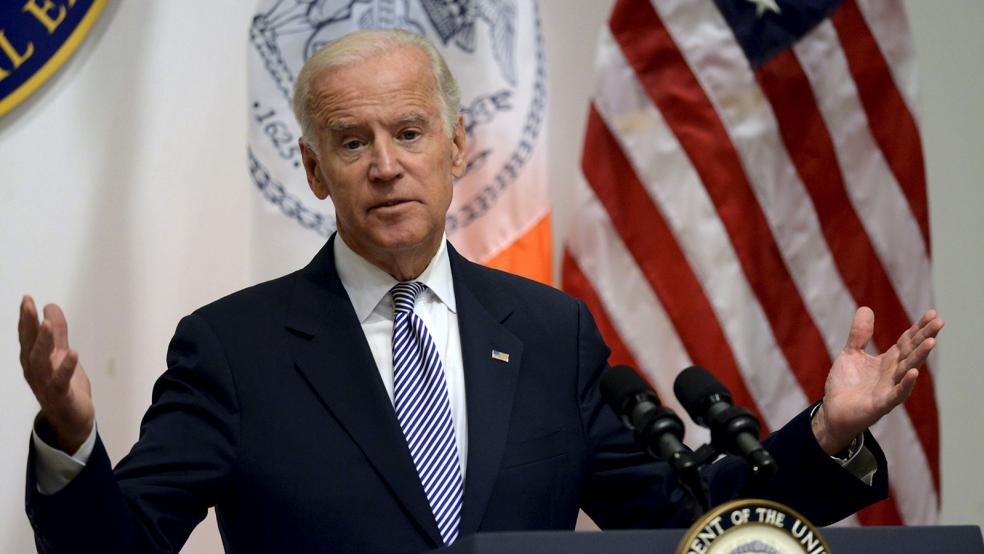Hillary Clinton’s strong performance in the first Democratic debate on Tuesday night was seen by many as a serious blow to the possibility that Joe Biden might run for president. But the announcement Thursday that U.S. troops would remain in Afghanistan in large numbers even after the Obama administration ends arguably does far more damage to Biden’s chances.
With a grim-faced vice president standing at his side, the president made the announcement Thursday morning that nearly 10,000 U.S. soldiers will remain in Afghanistan through 2016, with that number dropping to 5,500 in 2017, essentially admitting that he had failed to keep his promise to bring all U.S. troops home by the end of his term.
Related: Thought al Qaeda Was Finished in Afghanistan? Think Again
Obama and Biden campaigned hard in the last election on their plan to end U.S. involvement in Afghanistan, which the U.S. invaded after the 9/11 attacks in 2001. Voting for their Republican opponents, they warned, was voting to keep U.S. troops stationed in the volatile region indefinitely. That now appears to be the Obama administration’s plan as well.
“While America’s combat mission may be over, our commitment to Afghanistan and its people continues,” Obama said in a White House announcement. “I will not allow Afghanistan to be used as safe havens to attack America again.”
It was a tacit acknowledgement that the administration’s plans have neither pacified the war-torn country nor made it impossible for terrorist groups like al Qaeda to operate bases there – the primary reason for the 2001 invasion in the first place. In fact, just last week U.S. and Afghan forces had to mount what a military spokesman called “one of the largest joint ground-assault operations we have ever conducted in Afghanistan” to destroy a pair of al Qaeda training camps that were operating in Kandahar province.
This is a real problem for a Biden presidential run. Plenty of vice presidents have run for the Oval Office by distancing themselves from some of the more unpopular or embarrassing elements of the previous administration’s policy.
Related: General – U.S. Troops Will Still Be in Afghanistan When Obama Leaves Office
The problem for Biden is that U.S. policy in Afghanistan has been, in large part, his policy.
Biden came to the vice presidency from the chair of the Senate Foreign Relations Committee, where he served for decades. When the new Obama administration began debating how to handle the ongoing war in Afghanistan, Biden was intimately involved in the discussion.
In 2009, he prevailed over General David Petraeus in a policy battle over how to approach Afghanistan. Petraeus had been in favor of a massive surge of troops as well as civilian experts into the country. The idea was to take territory away from extremists, including the Taliban and remaining al Qaeda elements, and then bring in civilian experts to help the local populace build lasting institutions of government and commerce that would make it difficult for extremists to find purchase there in the future.
Biden objected to the idea of using U.S. troops and civilians to try to construct a modern Afghanistan in place of the rubble left behind by the Taliban. In the end, his point of view prevailed. Petraeus got fewer troops than he wanted (though more than Biden recommended) and the U.S. put less focus on nation-building.
Related: How the U.S. Wasted Billions of Dollars Rebuilding Afghanistan
Whether the Petraeus plan would have succeeded in turning Afghanistan into something resembling a modern society is an open question, but it is clear that Biden’s belief that the U.S. could keep terrorists and extremists at bay with a relatively small troop deployment was plainly wrong.
Also wrong were promises that Obama and Biden made during their second campaign in 2012, in which they unequivocally said the U.S. would withdraw its troops by the end of this year.
With videos like this one available on YouTube, the anti-Biden campaign ads write themselves.





